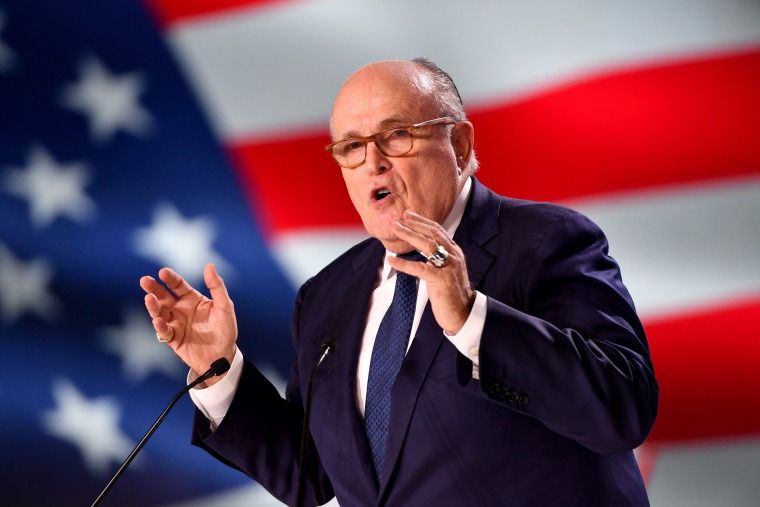WASHINGTON — A current State Department official and a former one testified Wednesday in the House impeachment inquiry, a day after Lt. Col. Alexander Vindman testified that he had raised concerns to his superiors about the phone call between President Donald Trump and the president of Ukraine that prompted the inquiry.
Catherine Croft, a special adviser for Ukraine at the State Department, testified behind closed doors for more than five hours before the three House committees leading the inquiry.
Christopher Anderson, who was a special adviser to former U.S. special envoy to Ukraine Kurt Volker, followed Croft, testifying in the early afternoon. Anderson left his position in mid-July and was succeeded by Croft.
According to their opening statements obtained by NBC News, neither Anderson nor Croft listened firsthand to the July 25 call between Trump and Ukraine President Volodymyr Zelinskiy.
Croft, who joined the National Security Council in July 2017 and stayed there through the first half of 2018, planned to testify to lawmakers that she received multiple calls from Robert Livingston — a lobbyist and former GOP member of Congress who resigned in 1998 — who told her that Marie Yovanovitch, the U.S. ambassador to Ukraine, should be fired.
“He characterized Ambassador Yovanovitch as an 'Obama holdover' and associated with George Soros," she planned to say, according to prepared remarks. "It was not clear to me at the time — or now — at whose direction or at whose expense Mr. Livingston was seeking the removal of Ambassador Yovanovitch."
Croft said, according to that release of her opening statement, that she had documented those calls and told her boss, Fiona Hill, then a top White House adviser for Europe and Russia, and George Kent, the deputy assistant secretary for European and Eurasian Affairs, and that she was not aware of any action that was taken in response. Trump removed Yovanovitch as ambassador in May.
Croft was also expected to say that in July, she participated in a video conference where an official at the Office of Management and Budget reported that acting White House chief of staff Mick Mulvaney had placed a hold on U.S. security assistance to Ukraine. The only reason given was that the order came "at the direction of the president."
Anderson, who testified for roughly four hours, had been expected to say in his opening statement that former national security adviser John Bolton had cautioned him that “Giuliani was a key voice with the president on Ukraine which could be an obstacle to increased White House engagement.”
Anderson was also expected to testify that Rudy Giuliani’s attempt to urge the Ukrainian government to open investigations was discussed at a Ukraine strategy meeting in June. A few days later, on June 18, Secretary Rick Perry hosted "a follow-up meeting at the Department of Energy to discuss how to move forward” with engaging Ukraine.
And Anderson was to say that just before Zelenskiy’s inauguration in May, he saw the tweet by Giuliani saying that, as president-elect, Zelenskiy was “surrounded by enemies of President Trump.” To counter Giuliani’s statement, Anderson will testify that he pushed for a high-level delegation to attend Zelenskiy’s inauguration, which included Perry; Ambassador to the European Union Gordon Sondland; Volker; Vindman, the top Ukraine expert on the National Security Council; and Sen. Ron Johnson, R-Wis.
Both State Department officials were told by Undersecretary of State Brian Bulatao on Oct. 28 not to appear before the committees, guidance that came from the Office of the White House Counsel. Both witnesses are appearing under subpoena, according to their attorney, Mark MacDougall.
MacDougall said in a statement that neither Croft nor Anderson are the whistleblower who prompted the Ukraine inquiry into the president, but he said that they will protect that person's identity in their depositions. Trump has said the identity of the whistleblower should be made public.
"To the extent we reasonably conclude that any questions directed to Ms. Croft (and Mr. Anderson) this morning are intended to assist anyone in establishing the identity of the Whistleblower, we will make the necessary objections and give the witness appropriate instructions,” MacDougall said.
Their testimony came a day after Vindman, appearing voluntarily under congressional subpoena, told members of Congress that he was on the Trump- Zelinskiy call in which Trump asked for an investigation into the Bidens — and that he raised concerns about the conversation to his superior.
Vindman also told lawmakers that he tried to edit a White House log of the July phone call to include details that were omitted.
NBC News learned Wednesday that Vindman told House investigators that a White House meeting between Trump and Ukraine's leader — as well as the delivery of nearly $400 million in security and military aid — was “contingent” on Ukrainian officials carrying out multiple investigations, including into Burisma, the Bidens, the 2016 election and Crowd Strike.
In his opening statement, Vindman said he “did not think it was proper to demand that a foreign government investigate a U.S. citizen, and I was worried about the implications for the U.S. government’s support of Ukraine."
Two sources familiar with the closed-door testimony said that Vindman's testimony went further than his opening statement by drawing a direct line between the deliverables for Ukraine and the multiple investigations.


